Peter MALONE
Saturday, 18 September 2021 19:57
Give Me Your Heart
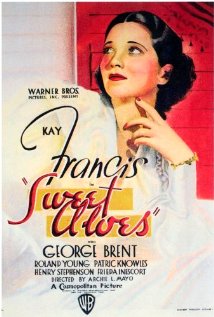
GIVE ME YOUR HEART
US, 1936, 88 minutes, Black-and-white
Kay Francis, George Brent, Roland Young, Patric Knowles, Henry Stephenson, Frida Inescourt, Helen Flint, Halliwell Hobbs.
Directed by Archie L. Mayo.
Give Me Your Heart is a Warner Brothers melodrama of the mid-1930s, something in the name of Stella Dallas, but more upper-class. It is interesting in view of the recent introduction of the Motion Picture Code, to see how adultery and illegitimacy are treated, explicitly but not too explicitly.
Kay Francis portrays a young woman who has an affair with a married man in England, son of gentry. She is persuaded by the man’s father, Henry Stephenson, quite sympathetic, to give up the child so that it can be reared as his grandson by his father, Patric Knowles, and by his mother, Frida Inescort. She agrees and goes to the United States, meeting a genial man on the train and on the boat and, eventually, marrying him, George Brent.
Roland Young portrays an author, friend of the young woman and concerned about her and engineers a trip to the United States to meet her at the same time as the father of her child and his wife are visiting. She is under strain, attending a doctor, Helen Flint, but agrees to go to a meal and, finally, meeting the wife and seeing her child – at least giving her some peace as a mother and the satisfaction of knowing that her child will be brought up well.
1. Drama and melodrama – and the touch of soap operas for the 1930s? An emotional Warner Brothers production?
2. The 1930s, black-and-white photography, the British setting, the mansions, the contrast with the United States, society, apartments, welcome?
3. The title and the reference to the central characters, to Linda and her love for her child?
4. The Motion Picture Production Code and issues of legitimacy, unmarried mothers… The treatment for the 1930s?
5. Linda, the focus, with Robert, not knowing he was married, her pregnancy and if there? The reticence? Tubbs, his knowing the truth? Her relationship with her aunt? Her father, going to Naples for advice, the bond with her father, his death? The return home, cabby arranging the talk with Lord Farrington, his sympathetic approach, the proposal, her emotional response, needing time to think?
6. Her going to London, lonely, Tubbs, pregnant, Lord Farrington paying – and the pregnancy and birth of the screen?
7. Going to the United States, the financial support, meeting Jim Baker, talking on the train, his genial approach, the voyage?
8. The two years passing, her marrying Jim Baker? The contact with England, giving her father’s books to Lord Farrington, his putting them on the shelves, for his grandson, the scenes with the baby boy? In the sound and the visit, no contact from Linda? Tubbs not knowing?
9. Linda in New York, being called Bill, her love for her husband, his being pleasant, hard-working, the socials, her drinking, his concern, proposing the trip, her negative reaction? Her life, friends, moods, trying, inability to respond? Her continued worry, the secret about her child?
10. Jim Baker, becoming more desperate, trying to please his wife?
11. The doctor and Tubbs and the taxi, arrival at the door, visiting the same apartment? Tubbs and his tax advice from Jim, the discussions, going out of the room, meeting Linda, talking with her, her refusal to talk about the child?
12. The doctor, care for Linda, the massage? Agreeing to go to the meal? Travelling with Tubbs In the taxi, the humorous subplot of unlikely romance?
13. The dinner, Robert and his wife, Linda seeing them? Meeting, the drink at the bar, her moods, Tubbs and his diplomacy? Robert and his anxiety?
14. Robert’s wife, the past illness, taking the baby, taking a long time to forgive her husband, her wanting to talk with Linda, going to the room, the melting of hatred, seeing the child, the bonds, arranging for the gift? Linda and her friendship, moments of peace?
15. The doctor telling Jim to take a tough stance – and his thinking that that was the solution for everything?
16. The touch of soap operas while treating serious issues, emotionally?
Published in Movie Reviews
Published in
Movie Reviews
Tagged under
Saturday, 18 September 2021 19:57
Possession, The/ 2012
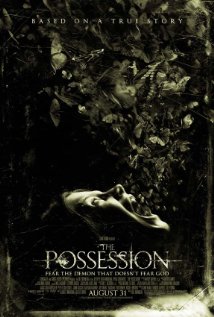
THE POSSESSION
US, 2012, 92 minutes, Colour.
Jeffrey Dean Morgan, Kyra Sedgwick, Natasha Calis, Madison Davenport, Matisyahu, Grant Show, Jay Brazeau.
Directed by Ole Bornedal.
The Possession is another exorcist film, with many of the conventions of the genre. However, there is a significant difference, the film having a Jewish setting and the possessing demon being a Dybbuk (although many Jews do not consider exorcism as part of their tradition).
The film centres on a mysterious box which the audience has seen wreaking destruction on its owner. A divorced husband, Jeffrey Dean Morgan, has custody of his two daughters for the weekend and goes to a yard sale with his younger daughter choosing the box. The spirit is female, the box is opened, and the spirit takes possession of the young girl. While the father is frantic, the mother, Kyra Sedgwick, increases her anger against her former husband.
Eventually, the husband goes to New York City, consults some rabbis, discovers an expert (played by Matisyahu, an authentic Rabbi) who comes to exercise the exorcism. He is successful, the Dybbuk returning to its box, but…
1. The title? Possession by evil spirits? The box as a sinister possession? The Jewish background? The Dybbuk? Jewish traditions and exorcisms?
2. The American town, homes, school, the new house, hospitals? Authentic atmosphere?
3. The contrast with New York City, the Jewish neighbourhoods, the meeting with the rabbis? The musical score?
4. The film based on a true story? Exorcism genre and conventions? The mysterious box, the evil power, confined, getting out, seeking the innocent, possessing the innocent and consequences, destructive consequences, overpowering another personality, the possibilities for exorcism and healing?
5. The Jewish background for this kind of film, the comparison with the audience familiarity with Catholic situations, beliefs? Jewish evil spirits and tradition? The rituals and performance? Containing the evil?
6. The family breakup, Clyde and Stephanie, the divorce, the effect on their daughters? Clyde as a basketball coach, with the men, his style, getting them to imagine their techniques? The separation and his building a new house, coming home to get his boxes, the material on his computer and clearing it? His not turning up to his daughter’s performance? The job offer in North Carolina and Stephanie’s anger? The clashes with his ex-wife? Taking Hannah and Emily for weekends, the strict injunctions about their food? Their being comfortable with their father? Hannah and her dance performance? Emily and her eagerness?
7. Going to the yard sale, buying the box, Emily treasuring it, opening it, wearing the ring? The insects and the torment? Clyde killing the insect? Emily and her moods, chomping the food, saying there was a woman inside that she could not see? Confronting her father, the blows? Hannah’s reaction? Stephanie and her anger?
8. Stephanie and Brett, the relationship, his being in the house, Clyde’s anger? Emily confronting Brett, his being attacked, the blood and his teeth, the collapse?
9. Clyde going to see the professor, the explanation of the box, the Hebrew lettering, Clyde driving to New York City, the meeting with the rabbis? The young rabbi travelling to the home, to the hospital?
10. Stephanie and Emily, the tantrums, Stephanie being mystified, the risk to the life, taking her to hospital?
11. At the hospital, the rituals, taking her to a separate room, the prayer, the ousting of the spirit, the visuals of it creeping back towards the box? Clyde willing to sacrifice his life, the violence to him?
12. Emily restored, Stephanie and Clyde and their bonding again, the final scenes of a happy family?
Published in Movie Reviews
Published in
Movie Reviews
Tagged under
Saturday, 18 September 2021 19:57
Nightwatch/ 1994/ Nagtevagen
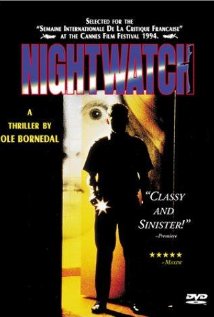
NIGHTWATCH/ NAGTEVAGEN
Denmark, 1994, 107 minutes, Colour.
Nikolau Coster Waldeau, Sofie Grabol, Kim Bodnia, Lotte Andersen.
Directed by Ole Bornedal.
Ole Bornedal wrote a very successful suspense thriller about a serial killer, Nightwatch, released in 1994, with prominent stars, Nikolar Coster Waldeau and Kim Bodnia.. It won many awards.
Miramax persuaded Bornedal to write a script for an American version of the original and invited him also to direct it. It was released in 1997 to unfavourable reviews.
The Danish version has a very strong cast as does the American version. Ewan Mc Gregor plays the role originated by Nikolaj Coster -Waldau, a law student who takes a job as a nightwatchman in order to have time for study. However, mysterious things are happening, especially women being murdered and sexuality assaulted after their deaths. Nick Nolte plays the intense inspector trying to solve the case. Patricia Arquette plays the girlfriend. Josh Brolin plays the hero’s rather wild friend who seems to be wanting to bring him out of himself with all kinds of dares. Suspicion initially falls on him – but before the end, he is found to be innocent and it is then perhaps more obvious who the killer is.
The American version is enjoyable in its way. The Danish version has a greater intensity.
The following questions can be used for both versions of the film. The American names are used here. However, in the Danish version the hero is still called Martin, the girlfriend is Kalenka, the best friend is Jens.
1.An interesting murder mystery? Serial killer? A film of the 90s and the exploration of the dark side? A police investigation? A young man being framed for murder? The psychological background?
2.The town, the night scenes, the dark? The morgue, large, dark? The garbage area?
3.The title, the adaptation from the original Scandinavian film? The comparison between the two? The musical score?
4.The credits sequence: the prostitute, the aggressor, the death, the assault, the removal of the eyes?
5.Martin as a law student, his relationship with Katherine? His friendship with James? The bonds? His taking the job, the work, the opportunity for study? The atmosphere, the alarms, the doctor? His brashness? His being interrogated by Inspector Cray? His naivety? Becoming more frightened, the increased number of the corpses? James and his dare? The restaurant, the background of sexual encounters, the clash with the girl? The building up to doubt concerning James? The archives? The build-up to the climax, Martin in danger, vindicated?
6.James as best friend, his manner, personality, risks, sexual encounters, the discussions with Joy, trying to set her up with Martin? His suspicious behaviour? His change of behaviour? The build-up to the climax?
7.Katherine, her work, her relationship with Martin, in love, sharing, the proposal, her being hurt? Joy and the visits? The dangers?
8.The prostitutes, Joy, the set-up with James, the humiliation? The irony of her relationship with Inspector Cray?
9.Inspector Cray, his tough manner, his staff, conducting the investigations, the interview with the doctor, the interrogation of Martin? The information, his theory and the need to confess? The set-up? His framing Martin, the murders, his violence, the final confrontation?
10.The atmosphere of the dark side, serial killers? Deaths, sexuality and violence?
Published in Movie Reviews
Published in
Movie Reviews
Tagged under
Saturday, 18 September 2021 19:57
Hitman Agent 47
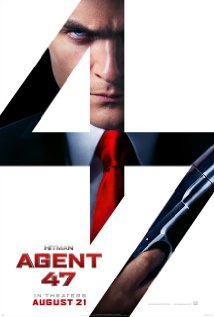
HITMAN AGENT 47
Germany/UK, 2015, 95 minutes, colour.
Rupert Friend, Hannah Ware, Zachary Quinto, Ciaran Hinds, Thomas Kretschmann.
Directed by Aleksander Bach.
Hitman Agent 47 is based on the computer game, Hitman. The film unfolds just like a computer game, quest, pursuit, hero, obstacles, deaths, final confrontation.
The film has the added advantage of some sequences in Salzburg, most in Berlin, capitalising on the scenes of the city, and the same in Singapore, once again with the atmosphere and views of the city.
An explanation is given that in the 1960s, the United States developed a plan for the creation of his men, assassins, geared to have no emotions. The assassins went into action but the decision was made to close down the program. In the meantime, the head of the company, The Syndicate, Thomas Kretschmann, wants to re-open the program. Through quite a complicated set of technical means, which might leave the ordinary audience puzzled, it is determined that the possibilities for development centre on a young girl who has grown up in Berlin. The syndicate sends its agents to find her and bring her back to start the program again.
In the meantime, she is poring over documents in a Berlin library to find a mysterious man. Ultimately, he is revealed as her father, Ciaran Hinds.
In the meantime, Agent 47, Rupert Friend, ruthless and unemotional, has been sent by his superior to save the girl, Hannah Ware – the ulterior motive, revealed at the end, being to infiltrate the Syndicate Office in Singapore and destroy the director.
This leads to quite an amount of activity and chases in Berlin, at Alexanderplatz, in the underground and in the streets. It sets up a confrontation between the special agent from The Syndicate, Zachary Quinto, who wants to take the girl to the headquarters and tries to preserve her at any costs, fighting Agent 47 who, he says, is after the girl and her death. There are some computer game confrontations, fights, especially on the electrified railway lines in the Berlin underground.
The father is discovered, an elderly man, and once again there are many chases and pursuits.
The action and the characters transfer to Singapore for a final confrontation, the head of The Syndicate remaining under guard and never coming out of his office, but persuaded to do so to confront the girl and find out the truth. In the meantime, his agent, Zachary Quinto, has taken the father and tortures him with serums.
A whole lot of chasing, a whole lot of shooting, of a whole lot of deaths, the head taking off in a helicopter with the father. This means that in the building, Agent 47 and the girl have to up to the roof, confront a lot of guards, the Agent fighting with Quinto, and the culmination where the father, for love of his daughter, explodes the helicopter. Which seems an ending except that suddenly, Agent 47 is confronted by his lookalike agent – who shows no emotion a motion except to confront Agent 47.
1. Thriller based on a computer game? The format, the plot, characters, confrontations, dangerous situations, deaths and audiences identifying with the characters?
2. The special effects, action sequences, stunt work, the fights and chases, crashes? The musical score?
3. The background explanations, the 1960s, the development of emotionless assassins? The effect? Closing down the program? The search for the inventor? The search for his secrets – and the discovery that they were embodied in his young daughter? The question of the daughter, the daughter’s quest for her father?
4. The Syndicate, the head, his determination, his previous knowledge of the inventor, the inventor saying he was less intelligent? His sending out John Smith to find the girl and bring her back? His office in Singapore? His guards?
5. Saltzburg, the files, the discoveries?
6. Berlin, Katia, in the library, the librarian asking questions, unable to find her father? The confrontation with John Smith, his trying to protect her, the attacks by Agent 47? The dangers in the city, the underground, the railway lines, the fights, the rescue?
7. The discovery of the father, the inventor, love for his daughter, his secrets? Agent 47 helping him?
8. Going to Singapore, the work of the head of The Syndicate? John Smith and his taking the father, torturing him? Agent 47, seeming exercise of emotion, helping Katia?
9. The build-up to the climax, the head coming out of his office, his being in danger, the interrogation of the father? Katia, Agent 47, going to the roof? The helicopter taking off? The fights on the roof, agent 47 and the wounds, Katia and her grief at her father’s going? The final fight between Agent 47 and John Smith?
10. The helicopter, the father exploding it?
11. Agent 47, with Katia – and the lift opening with the new agent, in the likeness of Agent 47, appearing?
Published in Movie Reviews
Published in
Movie Reviews
Tagged under
Saturday, 18 September 2021 19:57
Crowd, The
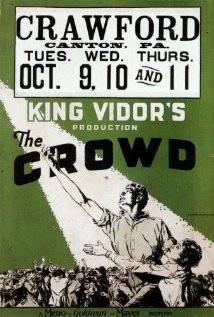
THE CROWD
US, 1928, 98 minutes, Black and white.
James Murray, Eleanor Boardman, Bert Roach, Estelle Clark, Lucy Beaumont.
Directed by King Vidor.
The Crowd was one of the finest silent films at MGM, quite outstanding in its technique, the quite spectacular with the times overhead views of New York City and the harbour, the impact of filming of the skyscrapers and the city streets, the lights at Coney island, much more sophisticated than many of the silent films and even the sound films in coming years. The film was directed by King Vidor, a significant director at MGM at this time, with such films as The Big Parade, a powerful film about World War I, and Proud Flesh. Vidor was to continue making films for another 30 years, some melodramas in the 1940s like Duel in the Son and, at the end of his career in the 1950s, the Henry Fonda – Audrey Hepburn version of War and Piece and the biblical Solomon and Sheba.
The film was also striking in its presentation of the American dream – that everyone could be president, but that practically no one becomes president. The film opens on 4 July 1900, with celebrations for independence, and the birth of the hero, John Sims. His father has ambitions, as does the son, going to work in a vast office (the desks in the space also strikingly filmed), an ordinary accountant. He goes on a date with a friend, enjoys the company of Mary, offers to marry her – though the friend does not give the marriage much chance of success – and they go on honeymoon to Niagara Falls (also strikingly filmed) but seem rather reticent about the consummation of the marriage. Nevertheless, they have a child, and then another.
But, cramped in their apartment, they get on each other’s nerves, squabble, he going out drinking one night when his wife’s family has come for dinner, she wanting to leave – but finally revealing that she is pregnant. He continues in his job, the friend is promoted, he gets a small raise in five years. Matters remain tense until he thinks up a slogan which is accepted and they get a cheque for $500 – he buying many gifts and the occasion for the death of one of their children, hurrying across the street for the gifts, who is run down.
John Sims quits his job, can’t hold any jobs, trying to sell vacuum cleaners but saying that everybody had bought one, his brothers-in-law, who do not like him, offering him a job – but his wife feels that she should stay and support him. His son is supportive, even as he contemplates suicide over a bridge on railway lines. Finally, he has to accept himself, taking a menial job, in a costume suit, juggling in the street to advertise – and he had previously made fun of someone in a similar situation.
This is an American Everyman film, impressive in its techniques, rather grim in its perspectives on the unreality and some of the hopelessness in the American dream.
1. Status of the film as a silent classic? In terms of techniques? In terms of subject and Everyman themes? The American Dream?
2. The black-and-white photography, the style, movement, characters and situations, visitors?
3. The opening, Independence Day 1900, a new century, new hopes? The birth of John Sims? His father’s ambitions?
4. The boy growing up, the boys sitting on the fence, black and white, ambitions and hopes?
5. The cards of the years passing, John in his 20s? His job and the office, the vast space with so many desks? Eyes on the clock? Getting out on time, Bert and the invitation to a night out, John and his studies, deciding to go, Jane and Mary, going to Coney island, the lights, the rides, the attraction? John deciding to marry Mary? The marriage – but Bert dubious?
6. The honeymoon at Niagara Falls, the awkwardness and reticence? The return home, the cramped apartment? The routine sitting in? The attitude of Mary’s mother, her brothers, hostile? The family coming to dinner, John going out, caught by Bert, staying out for the night, drinking?
7. Getting on each other’s nerves, John and not getting promotions, Bert getting promotion? Nagging at home? Mary wanting to leave? Packing? Explaining that she was pregnant? John and his change of attitude, his concern? The birth of their son, John going to the hospital, seeing the baby?
8. The passing of the years, the small raise, the birth of the daughter? The scene at the beach, irritability, his thinking up the slogan, sending it in, success, the cheque for $500, buying all the gifts?
9. The children on the street, hurrying for the gifts, the child being knocked down by the car, the onlookers, the doctor, the death of the child?
10. Tensions between husband and wife, discussions with Bert, no promotions, quitting his job, trying to get other jobs, staying only a few days, trying to sell vacuum cleaners, pushing amongst the men to get a job, Mary’s brothers and the offer of the job? Mary and her wanting to go, the child supporting John, his thoughts of suicide on the railway bridge?
11. Mary about to leave, her deciding that she should state to support John? His getting the job with juggling, in the cartoon suit – something he had ridiculed earlier?
12. The American Dream, realism, the hard life – and the film coming out just the year before the Wall Street crash?
Published in Movie Reviews
Published in
Movie Reviews
Tagged under
Saturday, 18 September 2021 19:57
Divorcee, The
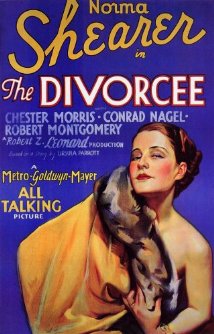
THE DIVORCEE
US, 1930, 84 minutes, Black and white.
Norma Shearer, Chester Morris, Conrad Nagel, Robert Montgomery, Florence Eldridge.
Directed by Robert Z.Leonard.
The Divorcee is the film for which Norma Shearer won the Oscar for Best Actress, the third in Oscar’s history. She portrays Jerry, a rather carefree woman, who has many suitors, deciding on Ted, Chester Morris, the man she loves, passing over Paul, Conrad Nagel, who is devoted to her but who marries Dorothy, disfigured, on the rebound. As the years pass, it emerges that Ted has an affair which he passes off in a rather carefree manner. On an impulse, and angry, she has a one night stand with Ted’s best friend, Don, Robert Montgomery.
Ted is unable to accept her behaviour while excusing his own. Jerry wants to tell the truth. They divorce, she decides to go on a rather promiscuous spree while he goes to Paris. Don avoids the situation. Paul returns, declaring his love for Jerry, but Jerry changes her mind during a visit from Paul’s wife. She decides that she really loves Ted and goes to work in London, going across to Paris, to meet him again, affecting reconciliation.
One of the dramatic difficulties is that Chester Morris is rather stolid as Ted, and audiences may find it hard to appreciate Jerry’s love him.
The film was directed by Robert Z. Leonard, the director of many dramas at the time and into the 1940s with When Ladies Meet and Pride and Prejudice.
1. A drama/melodrama of 1930? The morals and mores of the time? Marriage, fidelity, the perspectives of men, the perspectives of women? Divorce?
2. MGM production values, black-and-white photography, the skill of the director? The cast? Norma Shearer and her Oscar?
3. The story of Jerry, popular, wealthy, carefree, the many suitors? Her friend Helen and her divorce? The holiday, the suitors, Paul and his wanting to marry Jerry? Her choosing Ted?
4. The marriage, the anniversary, the party, Janice and her sinister presence, Teddy having an affair, his covering it up, confessing the truth, his downplaying it, Jerry and her being upset?
5. Ted going away on business, the friendship with Don, Ted’s friend, his approach to Jerry, the one night stand, its effect on her, on him – careless?
6. Ted’s return, Jerry wanting to tell the truth, Ted being upset, his own infidelity and his inability to accept his wife’s behaviour? Leaving?
7. The effect on Jerry, moving into a more promiscuous way of life, society, men, the International suitor? The divorce?
8. The importance of many of Jerry’s speeches, the marriage, love and fidelity, about divorce, about the status of men in the situations, about women? Her defiance? A working woman and her situation?
9. Ted, upset, going to Europe to work? His encountering Don, the threats to the man with whom Jerry was unfaithful – and Don’s reaction?
10. Paul, his finding Jerry, his wife, her disfigurement, the tension in the marriage, and knowing that he loved Jerry? Jerry responding to him, the possibilities for marriage, Dorothy’s visit, the discussion, Jerry being hurt, trying to do the honourable thing?
11. Jerry going to work in London, visiting Paris, the encounter with Ted, the confession, the reconciliation?
Published in Movie Reviews
Published in
Movie Reviews
Tagged under
Saturday, 18 September 2021 19:57
Behaving Badly
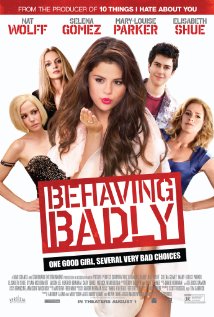
BEHAVING BADLY
US, 2013, 97 minutes, Colour.
Nat Wolff, Selena Gomez, Mary Louise Parker, Elizabeth Shue, Dylan Mc Dermott, Lachlan Buchanan, Heather Graham, Ashley Rickards, Jason Lee, Austen Stowell, Cary Elwes, Patrick Warburton, Gary Busey.
Directed by Tim Garrick.
Behaving Badly certainly lives up to its title. It is based on a novel, While I am Dead, Feed the Dog.
In itself, it is one of those routine high school comedies with an emphasis on the raunchy, a touch of the no-holds-barred in subject and treatment. What is surprising about the film is the number of significant Hollywood actors who have taken on roles, thrown off a lot of inhibitions, and give rather uninhibited performances. This includes Mary Louise Parker and Elizabeth Shue as two mothers, the latter as a rather promiscuous mother. Dylan Mc Dermott appears as a gangster running a club, and Heather Graham as a sexy lawyer. Cary Elwes is a father, divorced, in a gay relationship and Patrick Warburton is the principal of the school, a sex offender.
However, the focus of the film is on a teenager, Rick (Nat Wolff from Palo Alto and Paper Towns). He gives the impression of being rather innocuous, sometimes talking straight to camera, but not as innocent as he looks, doing messages for the club gangster, involved with some striptease dancers (and his sister is one of these), having a continued affair with the mother of his best friend. What he says he really wants is a relationship with the nice girl in the school, Selena Gomez.
While the film focuses on domestic problems, on the club, on affairs, there is also a subplot with Eastern European gangsters and Rick dobbing in his father as if he were a Mafia type, and his being interrogated by the local police, Gary Busey.
Also involved is the local priest, played certainly without inhibitions by Jason Lee, a swearing-in confession type, having an affair with Elizabeth Shue, having dubious connections with the Eastern European gangsters, seen in a mock confessional sequence.
In many ways, the jokes and cracks are obvious, even if rather cheap.
At its best, the film could be seen as something of a satiric black comedy. At its worst, a cheap and juvenile attempt at the raunchy.
Published in Movie Reviews
Published in
Movie Reviews
Tagged under
Saturday, 18 September 2021 19:57
Dope
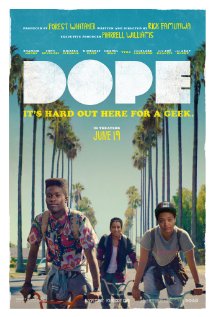
DOPE
US, 2015, 103 minutes, Colour.
Shameik Moore, Tony Revelori, Keirsey Clemons, Kimberly Elise, Blake Anderson, Bruce Beatty, Roger Guenver Smith.
Directed by Rick Famuyiwa.
At the beginning of this film, three definitions of Dope are offered: there is the obvious one about drugs; there is the obvious one about a fool; but there is also a meaning which offers dope as slang for something exuberant and exciting.
The central character of this film, Malcolm (Shameik Moore in a pleasant and ingratiating performance) lives with his mother at home in the black neighbourhood, dangerous neighbourhood, of Los Angeles, Inglewood. He is an intelligent young man, good at studies, smart with words and ideas, loving music from the 1990s which he and his friends like to play – in fact, they hold the 1990s (which was before their time!) in great regard, especially the music, the songs and the groups. Older audiences may remember that the 1990s saw the emergence of many of the African- American street films and gangster films – and stories of Boyz in the Hood. This is a 2015 version of Boyz in the Good Hood.
There is a narration by Forest Whitaker who is also a producer of the film. He explains Malcolm and his background, his best friend Jib, played by Tony Revelori, so effective as the bellboy in The Grand Budapest Hotel, as well is Diggy, who looks like a boy, but is explained as a young lesbian. The three are inseparable, played music together, are good friends.
The three do well at school, although looked down on by some of the tougher types, and bullied – but with Malcolm giving them their comeuppance later in the film, pulling a gun on them and their cowering away.
One afternoon they have to drive through difficult streets, are set upon, and a drug dealer suddenly wants Malcolm to be a go-between with him and the girl to whom is attracted. This leads to Malcolm and his friends, not without difficulties with the bouncers at the door, getting into a club to celebrate the dealer’s birthday. When the place is raided, the dealer puts the drugs in Malcolm’s schoolbag and, when he escapes, Malcolm discovers the drugs. Another dealer phones to make an appointment to collect them, when suddenly the actual dealer, now in prison, rings for them to be delivered to a wealthy mansion.
This leads, of course, to all kinds of complications, with Malcolm using his wits, making contact with a white dealer who is able to dispose of the drugs, get the money, set up secret accounts – which Malcolm can hold over the respectable boss dealing in drugs.
There are comic touches, serious and dramatic touches, Malcolm rather unwilling to be caught up in this kind of world when his heart is set on his studies, in going to Harvard, his thesis on Ice Cube, and using his wits to survive in the Hood.
The film is very local, made for an American audience, a local Los Angeles audience – which may mean, though an audience outside Los Angeles is invited in to participate and observe, that non-Americans might find that being on the outside makes it less easy to be involved.
1. A film about an LA neighbourhood, Inglewood, African- American neighbourhood?
2. A film about young people, hopes and ambitions, trapped in their neighbourhoods, having to deal with life shrewdly, friendships, family relationships, crime and violence, drugs?
3. The visualising of the neighbourhood, the streets, the homes, interiors, school, clubs, parties, the musical score?
4. The title, the meanings given at the beginning, drugs, a fool, something excellent!
5. The harking back to the 1990s, music, songs and groups? Malcolm and his friends emulating them? The reactions of later generations? The 1990s as the era of the emergence of black street films? This film as a parallel – but for life and opportunities 20 years later?
6. Malcolm, his story, his clothes, his square haircut, the narration by Forest Whitaker? Explanations, information?
7. Malcolm’s story, his age, living with his mother, well read, good memory, extensive vocabulary, his skill in writing, his thesis on Ice Cube? His love of music and playing? His fascination with girls, masturbation scenes? His ambitions, Harvard? The discussions with the principal, the principal putting him down, his standing his ground? The interview with the celebrity? The irony of his being the drug dealer?
8. Malcolm and his friends, Jib, his outlook on life, ambitions, a follower? The description of Diggy, appearing like a boy, lesbian? The friendship with the other two? Together? The attitudes of the kids at the school, looking down on them? The taunts at Diggy?
9. Riding on their bikes, through the streets, the neighbourhoods? Accosted by the thugs?
10. The drug dealer, wanting Malcolm to be a go-between with the girl, delivering the messages? The girl and her response? Inviting Malcolm to the party, the bouncers at the door not letting the group go in, getting the equipment, the dealer and his standover tactics with the owner of the club, the getting in, the dancing, Jib and his drinking, Malcolm and his school bag, stowed, the police raid, their dealer and his arrest, going to jail? Putting the drugs in the bag? Malcolm and the group getting away?
11. The drug complications, the phone call, the group following them, tracking them, with the GPS on the phone, putting it on the bus and the frustration of the dealer simply finding the phone?
12. The dealer in prison, his phone call, urging the delivery at the mansion? The son, his love for music, welcoming them in, recording, going to get the food, the tangle at the diner, his being wounded, back home? His sister, seductive, in the pool, leading Malcolm on? Malcolm’s willingness? The appointment for his interview, her offering to drive him, the erratic driving, getting out of the car, urinating in public, this being photographed, on the television news?
13. The interview, Malcolm’s hopes about Harvard, the reputation of the interviewer, the double talk about the drugs, Malcolm realising the drugs were for him? Using the analogy of Amazon and the need to get rid of the drugs? Malcolm, his shrewdness, going to the dealer, getting the drugs sold, the implications for the cash, the accounts and the hidden websites, Will Sherwood, white, the contact with Malcolm, his dealings, getting the information from the office about accounts, his setting up the accounts?
14. Malcolm, his return, the interview with the drug boss, his hold over him with the information about the accounts, the blackmail for Harvard?
15. Malcolm, the prom, the ticket for the girl, the discussions, his going? His helping her with her studies, her passing? His new haircut? Jib and Diggy?
16. A variation of Boyz in the Hood, 2015 style – with a better educated young man, better socially adjusted, intelligent, with higher ambitions?
Published in Movie Reviews
Published in
Movie Reviews
Tagged under
Saturday, 18 September 2021 19:57
Fitzgerald Family Christmas, The
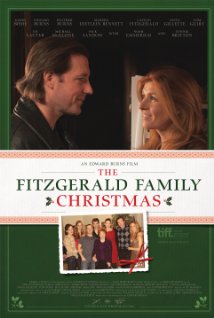
THE FITZGERALD FAMILY CHRISTMAS
US, 2012, 99 minutes, Colour.
Edward Burns, Heather Burns, Noah Emmerich, Anita Gillette, Tom Guiry, Ed Lauter, Malachy Mc Court, Michael Mc Glone, Joyce van Patten.
Directed by Edward Burns.
Edward Burns has had a significant career as an actor in films, including Saving Private Ryan as well is in his own films.
He made an impact with his first directed film, The Brothers Mc Mullen, a story of an Irish family, relationships and difficulties, the Catholic background. He followed this with She’s the One, again Catholic family, relationships and tensions. He has made several New York City films including No Looking Back. The Fitzgerald Family Christmas is in this vein.
Burns himself takes the central role of Gerry, the oldest brother amongst seven brothers and sisters, still living with his mother, his fiancee being killed in an accident, his visiting her mother, taking over the restaurant from his father who sold his interest and who walked out on his wife and seven children and remarried. This family Christmas is important, first of all because of the mother’s birthday is just before Christmas and everyone pulls out from the celebration with their various reasons, but all determined to celebrate Christmas with her.
The complication comes when the father, diagnosed with terminal cancer, asks if he can join the family again for the Christmas celebration. Most are for this but the youngest son who never knew his father is against it. When she hears about it, the mother is definitely against it, still bearing the wounds of the 20 years and his walking out. Her children tried to persuade her, but it is the visit to the mother of Gerry’s fiancee and their discussion about their husbands that somewhat mellows her and enables her to allow her husband to come back, even to forgive him.
One difficulty with the brief running time is that there are many subplots with the brothers and sisters as well as Nora from Boston and the audience not quite knowing which sister was which, which crisis was which.
There is a particularly Catholic tone about this film, absent from most of Burns’ films since Ash Wednesday in 2002. Irish Malachy Mc Court (who appeared as the chauffeur in She’s the One) appears as the parish priest, talking with the mother about secretly baptising one of the grandchildren, the husband going to a lengthy confession to him about his life, and the priest’s trying to persuade the mother to some kind of forgiveness and reconciliation.
1. Family story, bonds, broken bonds, mistakes, hurts, potential for forgiveness and reconciliation?
2. The films of Edward Burns, New York stories, families and relationships?
3. New York City, the suburbs, homes and apartments, restaurant, the church? The musical score? The feel of the city?
4. The title, the family, Christmas celebrations, Catholic background, Catholic spirituality, the use of Christmas and Advent songs and hymns, especially during the dinner?
5. The Catholic ethos, yet divorce, adultery, hurts, the husband walking out on his family, parenting and control, the Irish and large families, the mother and her bond with the church, arranging the baptism, discussions with the priest, the father going to confession, his plea for mercy from Rosie? The forgiveness? The family going to Christmas mass?
6. Action over a couple of days, the birthday, Christmas Eve, Christmas Day? Rosie and her children, the celebration, Gerry organising it, everybody pulling out? Having a birthday just before Christmas? The issue of the father coming, the various discussions, the issue, the tensions?
7. Rosie, turning 70, tough, 20 years without her husband, bringing up seven children, her dominating them, Gerry living at home? The visit to her neighbour, the neighbour’s love for her husband, the sadness of her daughter’s death and her being Gerry’s fiancee? Her missing her dead husband? Rosie babysitting, the Jewish father, his agreeing to the baptism and her going to the church? The discussions with the priest, his urging her to forgiveness? 20 years and her harsh responses? Ultimate forgiveness? The significance of her husband’s terminal cancer?
8. Gerry as the oldest, his care for his mother, the fixer for all the family, seeing him in action, his saying to Nora that he got no thanks? Managing the restaurant, inherited from his father, his father’s criticism of the lack of patronage? The death of his fiancee? Going to visit her mother, his kindness towards her? Meeting Nora, the friendship, Nora at the restaurant, their talking, the missing a train, staying the night, his advance and her resistance, his apology? The future? With each of his brothers and sisters, welcoming Cyril home, meeting him at the bus, concern about his relapse after being in rehabilitation? The discussions with his father? His hopes?
9. His brothers, Cyril coming out of rehabilitation, young, no photo with his father, reliance on Gerry, the sisters and their explaining his behaviour, the break-ins in their houses, crack, his not remembering? Rehabilitation, buying presents for the family? Very harsh on his father? Quinn, his life, self-centred, wanting to propose to the young girl, Francis Xavier and her friendship with him? Her betraying Quinn with Francis Xavier? His anger at his sister’s husband, the husband’s violence hitting his wife, coming to threaten him? Disappointment in his life? Not knowing details about his sisters’ lives? Dealing with his father?
10. The sisters, difficult to tell each one apart in the short running time? Their lives, relationships, the men in their lives, the unfaithful wife, the sacked husband and his violence, hitting his wife, her pregnancy? The relationship with Francis Xavier, his charm but being an older man? The older sister, her knowing about her father’s illness, having to keep secret? The tensions with her husband, Jewish, atheism, his celebrating with his family and her coming with the wine, her apology, the issue of the baptism?
11. The mother of his fiancee, old and ill, Nora looking after her? Rosie’s visit to her and their discussion, helping to break down the prejudice against her husband?
12. The father, seen in the wedding photos, the days of love and happiness, the seven children, his walking out, selling the restaurant, making the money, marrying, the divorce, after 20 years, terminal cancer, his plea to his children? The varying relationships with him? The discussions, his going to confession, Rosie asking whether he had repented and his saying yes? The families and their differences, the final meal after Mass? The hymns in the background, the lyrics about Jesus as saviour Christmas?
13. Moments of forgiveness and reconciliation – what future?
Published in Movie Reviews
Published in
Movie Reviews
Tagged under
Saturday, 18 September 2021 19:57
Alias Ruby Blade
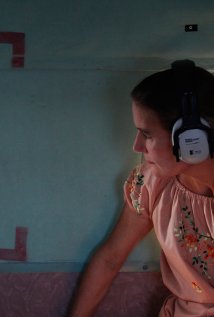
ALIAS RUBY BLADE
US, 2012, 78 minutes, Colour.
Directed by Alex Meillier.
Alias Ruby Blade is a very interesting documentary, an opportunity to grasp, within a small timespan, something of the history of East Timor in the late 19th century.
The director is an American and is particularly interested in the Australian, Kirsty Sword, and her role in the rebellion against Indonesia, contact with Xanana Gusmao, a go-between for him and Jose Ramos Horta, and her marriage to Xanana Gusmao and her role in modern-day East Timor.
The film uses a lot of footage showing Kirsty Sword, her early life, her friends in Djakarta, her work in communicating with Xanana, and later in East Timor. There is also footage of Xanana in the hills in rebellion, and, especially, in the Indonesian prison, details of his day to day life. There is also footage of him as he becomes a statesman in the new East Timor. There is also a great deal of television news footage, filmed in East Timor, in the countryside, in Dili, at the time of the vote on independence, the violent repressions by the Indonesians…
The film also has the advantage of interviews with José Ramos Horta with his perspective on the events between 1975 and 2002.
From 1989 to 1999, the Berlin Wall came down, the Soviet Union collapsed, apartheid was ended in South Africa, Nelson Mandela became the President of South Africa, East Timor, after the occupation and invasion in 1975, regained its independence and became a nation in 2002.
While the film is a political and social overview, it is also the personal story of Kirsty Sword and her relationship with Xanan Gusmao.
It is interesting that the American writer-director does not focus in any way on the role of the Catholic Church in East Timor nor the winning of the Nobel Prize in 1996 for the political leaders along with Bishop Carlos Bello, emphasising the role of the church in the peace process.
1. The history of East Timor at the end of the 20th century, the colony, the Indonesian occupation, the people, the rebellion, leadership? The story of Kirsty Sword?
2. Audience knowledge of this history? An American production and its perspective? The perspective of Kirsty Sword? Audiences aware of East Timor, the people, the relationship to Indonesia, to Portugal? To Australia and the refugees? The 1975 occupation and consequences? Rebellion? Repression and massacres? The leaders, Xanana Gusmao? Jose Ramos Horta in exile? Xanana in prison? The local militias? United Nations, discussions, the vote, peacekeepers? The aftermath and the emergence of the nation?
3. Freedom movements throughout the world in the late 20th century, South Africa and apartheid, the Berlin wall coming down, the end of the Soviet Union?
4. The use of footage, news and television? Home footage of Kirsty and her life? Of Xanana Gusmao in prison? In the hills? After the vote, as leader, as statesman? The people and the reporting in the news? Footage in East Timor and Tillie?
5. The interviews, with José Ramos Horta, his perspective, his history? With Geoffrey Robinson and his role? Pat Walsh and his helping Kirsty Sword?
6. Locations, atmosphere of the country, the countryside and beauty, mountains, the sea? The contrast with Djakarta, the modern city, the prison? International sequences and protests?
7. Kirsty Sword and her story, seeing the history through her eyes, background in Melbourne, upbringing overseas, her parents, Indonesia, the interest, East Timor? The introduction by Pat Walsh?
8. Her continued involvement, knowledge of the country, used as a go-between, messages from Jose Ramos Horta, to Xanana Gusmao, prison, computers, emails, phones, video cameras, Kirsty getting to know him, meeting him, the relationship? Her pregnancy? The decision to marry? Her support of her husband? Three children? Her role in education in East Timor?
9. The Indonesians, the occupation, President Suharto, the insurrection, his stepping down? The possibility for independence? The alternatives given, to remain a section of Indonesia, or an independent part, or complete independence? The vote and the statistics? The queues for voting, the officials, the announcement of the result?
10. The rebels, for so many years, in the hills, Xanana Gusmao as the leader? His loyal followers? Interviews with them? the descriptions of what happened?
11. Xanana Gusmao in the field, his being taken, in prison, cheerful, the photos, the video material? With the others, the bribes to the soldiers, his garden and bonsai plants, surviving in prison?
12. The establishing of the nation, the roles of Jose Ramos Horta, of Xanana Gusmao? The development of the nation of East Timor?
Published in Movie Reviews
Published in
Movie Reviews
Tagged under